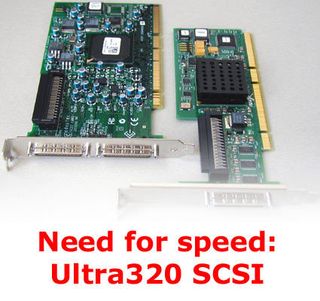Data Fever: Ultra320 SCSI from Adaptec and LSI Logic
Ultra320 SCSI: The Premiere Class In A Performance Test

There has never been so much capacity and such good hard drive performance for demanding applications as there are today. Modern IDE drives barely reach 60 MB/s; shamelessly expensive SCSI models won't necessarily reach much more. Now, serial ATA offers an easy and fast interface. So, why resort to the expensive SCSI standard?
Actually, in the entry-level range, the trend is clearly heading away from SCSI and toward ATA. Web hosts on all continents have long been offering rental servers with economical IDE hard drives. Because of the fast spread of IDE-RAID controllers (RAID 0, 1 and 10) there is hardly anything left to prevent potentially "secure" hard-drive arrays from being set up. The latest trend, even for the RAID 5 array, is based on ATA drives. Serial ATA could become the trendsetter; Western Digital has already rushed ahead with the Raptor series (10,000 rpm with Serial ATA interface).
In the enterprise market, however, things are somewhat different. Here, what counts are not only maximum transfer rates, but, to an equal degree, good I/O performance as well. Typical areas of application are database, file and Web servers, where as many queries as possible need to be answered. It has been our experience that both IDE hard drives and controllers are still inferior in this area.
In this article we take a detailed look at the actual performance of the Ultra320 SCSI. To determine maximum bandwidth and I/O performance, we used two recent host adapters from Adaptec (39320D-R) and LSI Logic (20320R). Also, we used a 39160 from Adaptec to determine parameters for comparison with the Ultra160 SCSI.
Stay on the Cutting Edge
Join the experts who read Tom's Hardware for the inside track on enthusiast PC tech news — and have for over 25 years. We'll send breaking news and in-depth reviews of CPUs, GPUs, AI, maker hardware and more straight to your inbox.
Current page: Ultra320 SCSI: The Premiere Class In A Performance Test
Next Page Ultra320 SCSI In DetailMost Popular

